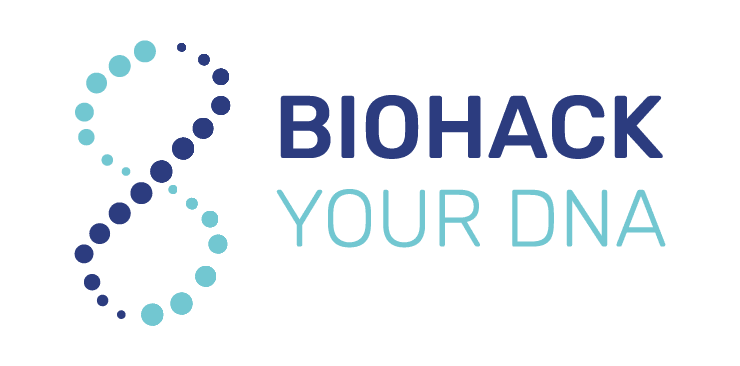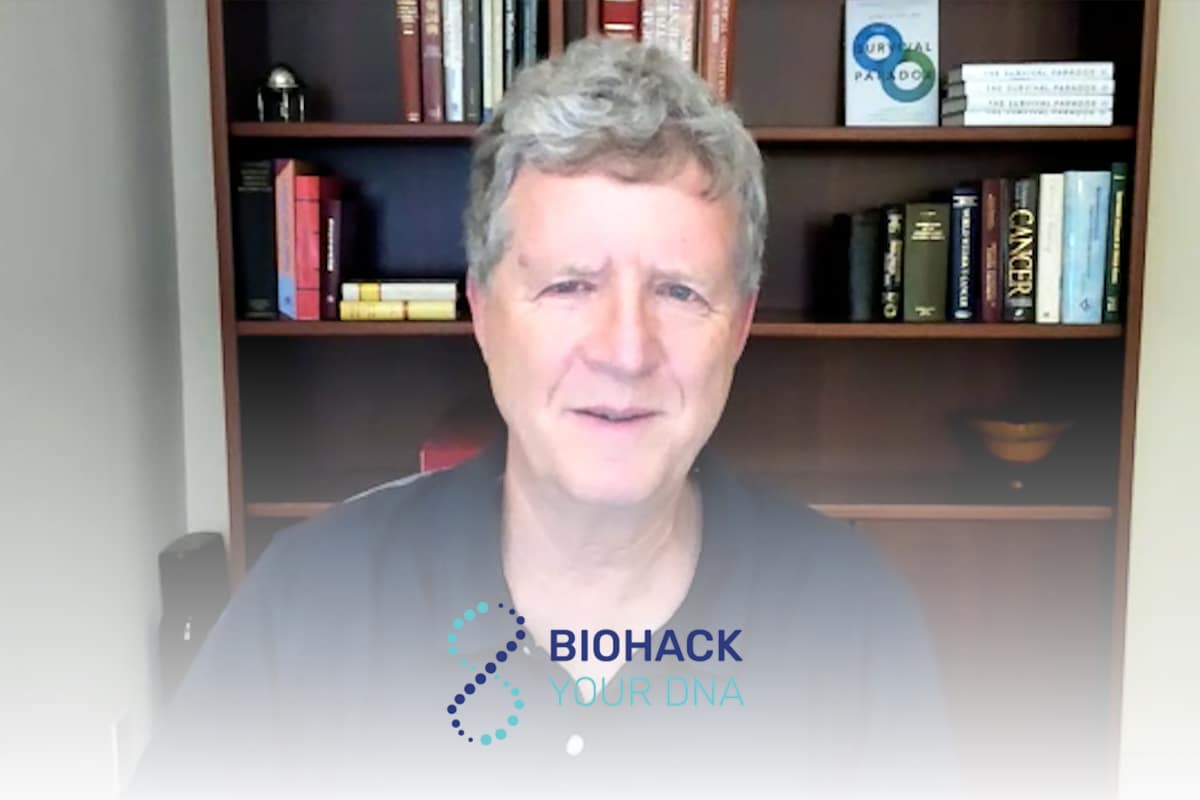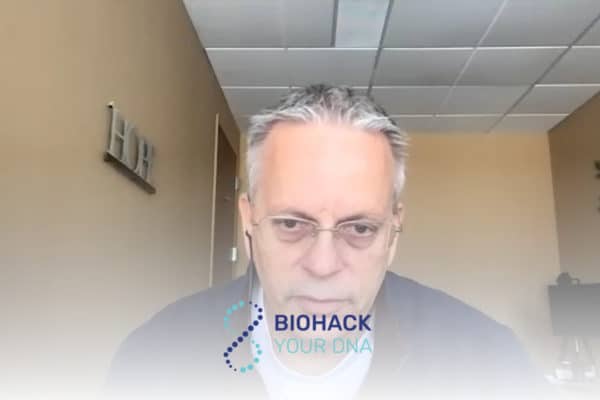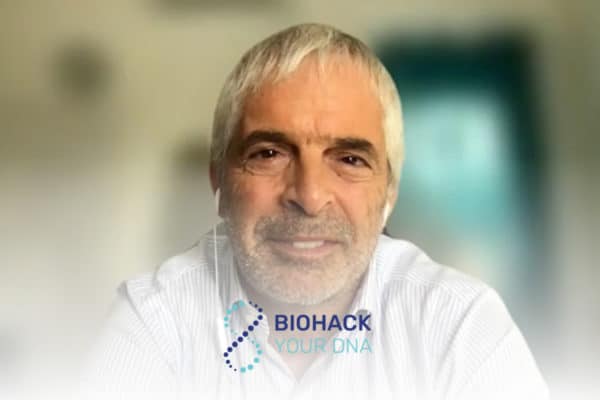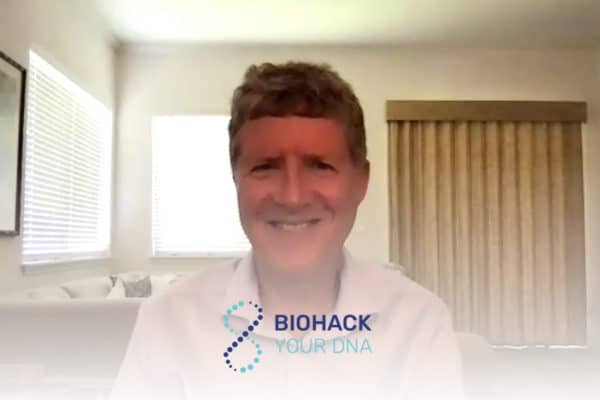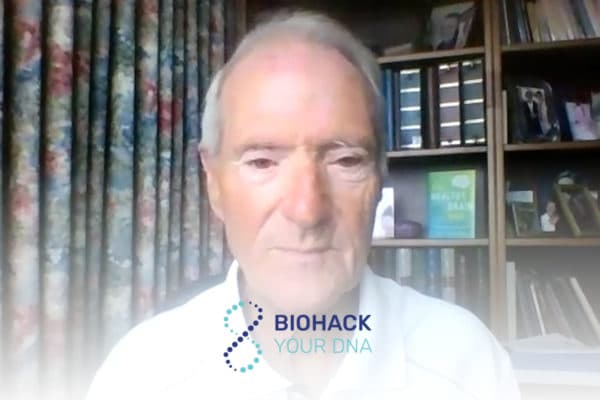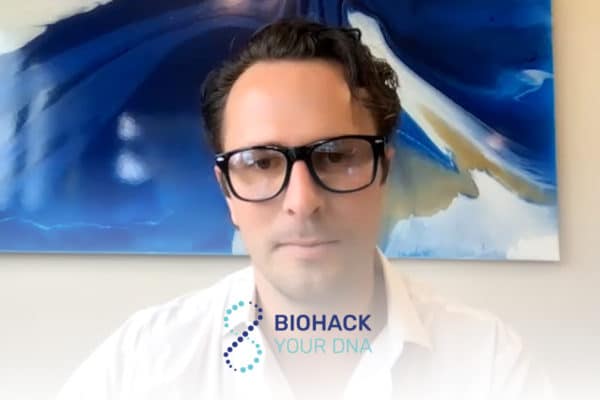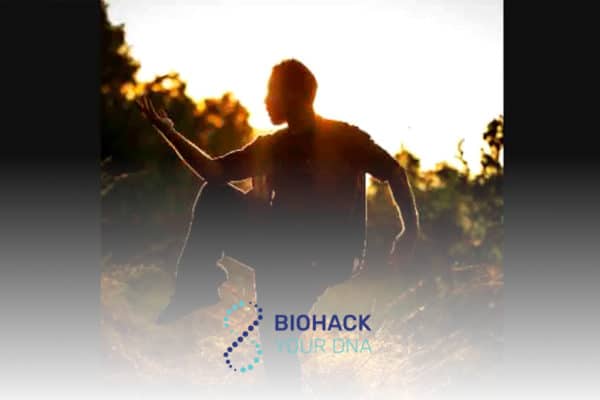Join the discussion below
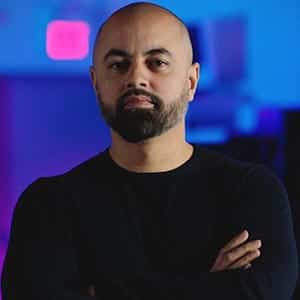
Kashif Khan is the Chief Executive Officer and Founder of The DNA Company, where personalized medicine is being pioneered through unique insights into the human genome. With the largest study of its kind globally, The DNA Company has developed a functional approach to genomic interpretation overlaying environment, nutrition, and lifestyle... Read More
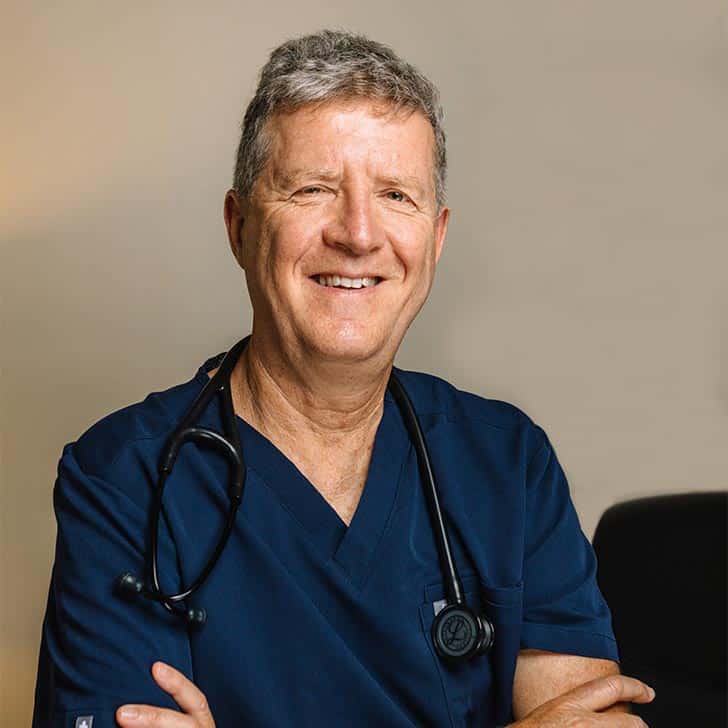
Isaac Eliaz, MD, MS, LAc has been a pioneer in the field of integrative medicine since the early 1980s, with a focus on cancer, immune health, detoxification and mind-body medicine. He is a respected formulator, clinician, researcher, author and educator, and a life-long student and practitioner of Buddhist meditation. With... Read More
- How to optimize mitochondrial health and mitochondrial function to assure optimized epigenetic expression
- How inherited epigenetics influence us on all levels and how to address these impacts for optimal health
- How to approach multi-generational healing and multigenerational trauma resolution
- What are the “scars of survival” and how to heal them
Related Topics
Autonomic Nervous System, Behavioral Choices, BioHacking, Chronic Disease, Detoxification, Emotional Healing, Epigenetic Expression, Epigenetics, Fibrosis, Galectin-3, Genetic Inheritance, Inflammation, Mitochondria, Multigenerational Healing, Scar Healing, Stress, Survival Drive, Survival Paradox, TraumaKashif Khan
Hello everyone, we are blessed today because not one time but now for the second time, we’re gonna be speaking to Dr. Isaac Eliaz and it’s a great honor after that first conversation we had, it truly blew my mind so first of all, thank you for joining us again.
Isaac Eliaz, M.D., MS, Lac
Thank you for the opportunity to take part in such an important topic.
Kashif Khan
You know, you opened my mind to this concept of the survival paradox. Of course I had poked through your book and some of the stuff we talked about last time resonated with what I had read in your book, but for those of us that are, you know, some people maybe just be listening to this for the first time and didn’t hear the first talk, do you mind just recapping, you know, what essentially is a survival paradox, brief intro, just so people know what they may have missed last time.
Isaac Eliaz, M.D., MS, Lac
Yes, of course, I’ll be delighted to do it. So the survival paradox and the title of my book really offers a paradigm shift of how we understand our health, but bigger than this, how we understand our life. And we all know that inflammation drives almost every chronic disease and acute diseases like the cytokine storm, but the survivor paradox takes a step back and say, if inflammation is really not the cause, inflammation is the results, it’s what happened, it’s like, the fire is on.
Kashif Khan
Yeah.
Isaac Eliaz, M.D., MS, Lac
So what causes the fire? And what causes the fire is our innate built in, multi-generational drive to survive. It’s really why I’m alive, you’re alive and this survival drive is automated so initially we respond with the nervous system, the autonomic nervous system, it’s all, you know, we can’t control it, it’s a sympathetic system through fighting which is inflammation and through running away, fleeing away which is either hiding isolation, creating a micro-environment or getting out of the scenery. The tissue becomes fibrotic with how we become so these factors that are automated within us drive us from an autonomic nervous system within a fraction of a second, you know, but if we look at it from the point of view biochemically, there’s a protein that I’ve been researching for almost 30 years, galectin-3, which is a carbohydrate binding protein which is our survival protein, which turns on within minutes, it goes to the area where the body feels there’s a survival issue and it drives inflammation.
And over a long time, it drives fibrosis so the same thing that we are trying to do to stay alive is what actually shortens our life and what causes chronic disease. And what we talked last time in detail is how it affects us emotionally, psychologically. So this drive which will for example, translate in simple terms to stress, to unhealthy lifestyle, of course will turn on negatively, negative, harmful genes. So our epigenetic tendency, our tendency to decide what to do with our potential is driven by the survival drive. And on a multi-generational level, we’ll talk a little bit more today, it can affect our gene expression and which genes will be expressed within the pool that we came to this world with. So that’s like fundamental understanding that really go through every aspect of our life, all the way, not only to the cellular level but to the mitochondrial level.
Kashif Khan
Yeah and what you said last time opened my eyes because even myself, you know, I blame myself when you talk about disease in general, everybody agrees that it’s rooted in inflammation but we were ignoring the fact that that’s one half, there’s also, you know, the fibrosis, like the other reaction, there’s the fight or flight, both things could potentially happen.
Isaac Eliaz, M.D., MS, Lac
Right.
Kashif Khan
And the flight part, we don’t really look at right, because it’s hard to, it’s maybe not even sensorial, you don’t even know as opposed to a rash, eczema, flare up, inflammation is there, it’s known right so.
Isaac Eliaz, M.D., MS, Lac
Right.
Kashif Khan
And to your point, we don’t ask why the inflammation happens so the other thing that you touched on which really blew my mind in our last conversation was this concept of multi-generational healing ’cause of course, on the genetic side, we have studied the epigenetic inheritance of things like trauma, you know, things that can be expressed in the next generation based on the experiences of the previous generation, you can literally not only inherit the genes but also the expression, the epigenetic expression. You’ve been talking about healing multi-generationally, what are these practices like, what is the actual function and how do people use them?
Isaac Eliaz, M.D., MS, Lac
So the first step and when I teach it in a context of a retreat, it’s a transformational experience. I have patients who went through profound healing just by hearing it in the right contrary. The first step is realizing that what we experience right now, what you and I experiencing right now is a result of endless factors that come from the present time, that comes from the past, which we can understand more right with the genetics and epigenetics and it come actually from the future.
Kashif Khan
Right.
Isaac Eliaz, M.D., MS, Lac
So right now our reaction, how we respond is rarely, rarely a result of the real moment because we are always affected by preconceived ideas, by habits and these habits create a very well paved pathway, habit that can be either genetic in nature, right?
Kashif Khan
Mm-hmm.
Isaac Eliaz, M.D., MS, Lac
Repeated in multi-generational or behavioral that we learn this life which falls more into the epigenetic choice or pure behavioral choice, so when we understand this, we can say, what can we do about it? So the first step is the recognition and then the willingness to change it which means the willingness to change our habits. Now you said something very important about fibrosis and scar and flight. This area of flight of fibrosis are hidden from us, right?
Kashif Khan
Right.
Isaac Eliaz, M.D., MS, Lac
They’re like under the biofilm, under the arteriosclerotic plaque, the area of the cancer cell that suddenly the body is not in charge, same thing happened on a psychological level, that’s what toxins, pesticide, heavy metals hide. So we need to access these areas that from the perspective of the body are actually not alive, the body no longer control them, they can be inflamed but we don’t control the movement of the inflammation that will happen in cancer, it’s classical. It has its own metabolism, its own existence, its own behavior so we need to connect with it. And the process of connecting with it is first when we prepare and you do it sometimes through detoxification process so the first step is the preparation, for example, if we look at detoxification as an example, I’m just picking it for now.
Kashif Khan
Sure.
Isaac Eliaz, M.D., MS, Lac
You prepare by getting a more lighter diet, getting well hydrated and preparing what you wanna get rid of, what you want to let go of and the bigger what we can hold, the bigger the response. And then we need to expose the areas that needs help, you know, we often try to change our health by changing our lifestyle, the proper disease is a last to go because we don’t have good communication with this area. It’s not responding to us as well and that’s why exposure, that’s why melting the galectin-3 lattice formation that we talked last time, these 5 pentamers of this protein that creates a coating and a microenvironment we don’t control, we need to expose it and then we need to clean it up. So if we look at the image and it’s one of the three last chapter in my book when I’m giving advice, it’s really about healing our scars of survival because our scars of survival can be related to what happened to us this life, and having actually a physical scar like from injury, from surgery, having an emotional scar, having a psychological scar or as we all aware of, multi-generational scars, trauma that have been carried on a epigenetic level and trauma that created a genetic chain that now has been carried on and it’s a combination.
So when we address it, addressing the physical scar is actually easier, you know, in the clinic, we simply take procaine which in an aesthetic and we numb a scar that can be there 30 or 40 years for 45 minutes. And I had some homeopathics and what you usually see is that the skull gets smaller, gets first inflamed and then gets smaller, gets smaller in a hundred percent of the people, practically a hundred percent. Some will go smaller by only 10, 15%, some by 60%.
Kashif Khan
Right.
Isaac Eliaz, M.D., MS, Lac
But whatever got smaller will never come back, how is this possible? Because the body, the area got numbed, it stopped signaling to the brain that something is wrong so if you look at this from a multi-generational within our body, the scar, what we are doing we are stopping a flow from the body to the tissue which is a sensory input into the brain right, that happened since we got the scar sometime 30, 40 years and now we can realign, so that’s what happened on a multi-generational level. So when we deal with scars like traumas then what happens, our response becomes different. When we are driven by trauma, by stress, by survival, we respond with the survival drive which per definition over time is going to be damaging. When we release, when the brain forgets this for example, it has a chance to start fresh so once we can stop this flow of information from the past and we can allow ourselves to realign, and the question is, how do we do it best?
We do it best by being really open, by having no rigid plan, by letting go of our habits, any habits, if we want to change our health, if we have a certain very chronic health issues, in order to change it, we have to change what created it, the highway that we drove to get this and the highway for us it’s habits, it’s eating habits and sleeping habits and behavioral habits and thinking habits. So the more we are open, the more we create flexibility in our way of thinking, in our tolerance to new ideas, to new concepts, to the ultimate level where we don’t hold to concepts at all, that’s where we have the room for change to happen. So we help it on a very simple level by blocking the survival protein galectin-3 and that’s why you see such amazing research on PectaSol, but on a deeper level, it’s an amazing journey you know. I know last time I shared my story during the book in the same chapter about my grandfather’s trauma with The Holocaust.
Kashif Khan
Right.
Isaac Eliaz, M.D., MS, Lac
How he died from stomach cancer and how I let go of it and it changed me and it changed my mother who didn’t know that I’m doing it, this is not an example, it can happen to all of us all the time. So the idea is to create a fresh flexibility and when we are flexible, our organs become flexible, our circulations become flowing and the cell knows that it’s not under stress. And when the cell is not under stress, it can produce energy in an efficient, peaceful way which doesn’t produce byproduct and when this happens, we got normal mitochondrial function. When we go into a stress response then our energy production shifts, and that’s when we get into trouble.
Kashif Khan
So you, I mean you said in there a key thing that people have to be willing to make changes for things that are new and novel so it’s uncomfortable to first of all, believe in stuff that you all haven’t previously been exposed to. A lot of people learn experientially, like they need to actually go through it to believe it’s real, like you can’t just read it or theorize it, I need to feel it, experience it then okay, yeah, maybe this is true. So, and I bring that up because in the very beginning of what you were saying, you mentioned that not only can epigenetic or, you know, multi-generational pain or problems come from the past but it can also come from the future. You know, and this is a concept that some people may not even be able to wrap their head around, the funny thing is that current science in physics says the same thing, right?
Isaac Eliaz, M.D., MS, Lac
Yeah.
Kashif Khan
Right so.
Isaac Eliaz, M.D., MS, Lac
Yeah, this is why it’s so fun for me because I’ve been living it for years and then come science and support it but all of that experience it, you know, we often go to something that happened in the past.
Kashif Khan
Right.
Isaac Eliaz, M.D., MS, Lac
And we dwell on it and if we look at our life experience, we are not living the moment, we are living the past.
Kashif Khan
Yeah.
Isaac Eliaz, M.D., MS, Lac
Right and it’s so common, right?
Kashif Khan
Yeah.
Isaac Eliaz, M.D., MS, Lac
I mean that’s how psychotherapist make a living, you know, sometimes right. So we go, we try to change something that already happened. Well, if we are right now living 20 years earlier and we keep the same habit 20 years from now, the energy going backward is gonna come to this moment so what we are doing now is affected by our mind projecting backward.
Kashif Khan
Right.
Isaac Eliaz, M.D., MS, Lac
But that is simple explanation, the more complex is that there are so many people related to us that we know and we don’t know I mean, you know it so well from all the genetic testing and the cousins we find and the relatives we find, right?
Kashif Khan
Yeah.
Isaac Eliaz, M.D., MS, Lac
All of them could be driving a certain trauma, a certain illness, a certain trait from three generation ago, 10 generation ago, 50 generation ago, hundred generation ago. If it happened as far as a hundred generation which by the way is an infinite number beyond, but it has been repeated, genetically passed on and epigenetically enhanced, you get a very strong highway, you know, when you drive for people who are listening, watching and the highway is very nice and very solid, it will last for a long time compared to a dirt road, right?
Kashif Khan
Mhmm.
Isaac Eliaz, M.D., MS, Lac
So we have a well paved multi-generational habit, it will last for many, many, many, many generations but within this generation, different people split and we no longer know they’re related to us, and they are all holding this pattern.
Kashif Khan
Yeah.
Isaac Eliaz, M.D., MS, Lac
So when we change and if it’s profound enough, and if we can hold the interdependence between us and others, everyone changes, that’s a little bit of the story that I told and we can feel it. We are in a room with somebody that is really happy and radiating, everybody gets happy.
Kashif Khan
Yeah.
Isaac Eliaz, M.D., MS, Lac
They don’t have to talk about it, right, you experience, I experienced it, it’s nonverbal. So that’s the power of the multi-generational healing and we do it when we get out of our head and into our heart, but the basic is we need to flow. And as long as we are stuck, as long as we are fibrotic, as long as we are isolated which is a survival trait, and that’s why physically galectin-3 can be so, so harmful. As long as we are stuck, it really can’t express itself so it’s all about melting, about turning the ice into water, you know.
Kashif Khan
Mhmm and you mentioned, you just touched on the mitochondrial health as an outcome of sort of multi-generational epigenetic expression so are you suggesting that my current mitochondrial function is a byproduct of my ancestors epigenetic expression that I’ve inherited, is that what you’re saying?
Isaac Eliaz, M.D., MS, Lac
Yes but also your own epigenetic doing this life, you know, with genes we decided to, definitely we know that when we go into survival mode, okay which again, for people listening, don’t think it’s something esoteric. Every time we are stressed about something, we’re in a survival mode.
Kashif Khan
Yeah.
Isaac Eliaz, M.D., MS, Lac
Now we have the opportunity to turn it off with a deep breath if it’s not very deep but some people on a survival mode on a chronic basis, what happens the system gets a signal and then what happened is that our macrophage, our immune cells that are actually swallowing, you know, bacteria or cancer cells, these cells actually who are outside in the extracellular metrics between the cells turn inflammatory. When they turn inflammatory they excrete galectin-3 and it blocks insulin receptors, the cell no longer can use glucose in a relaxed way. What is a relaxed way? It’s slow but very efficient, 36 molecules of ATP for one glucose, we gonna survival mode, we can produce energy hundred times faster that would happen when we fight or we run away. But only two molecules of ATP for one molecular of glucose and a lot of lactic acid and toxic byproducts, how does this happen? The survival mechanism blocks the insulin receptors being blocked or the gene that protects the cell from turning into a cancer cells gets blocked, the P53, very famous gene,
Kashif Khan
Right.
Isaac Eliaz, M.D., MS, Lac
And then suddenly the cell changes metabolism, right? I mean, people in your field, in this field, in this are very aware of the mTORC 1, you know, the one that helps to shut down the mitochondria. Well, if it’s really also driven and it drives something called hypoxia inducing factor, which means there’s no air, when in survival, we can’t breathe, it shuts down the mitochondria through an enzyme called PDK who blocks PDH. And then here we are with damaging metabolism, it affects diabetes, it affects a chronic infection that affects cancer, et cetera. So our journey is a journey of coming back to a more evolved, balanced way so for example, you know, let’s take cancer, we didn’t talk a lot about cancer last time. One approach to cancer is to try to kill cancer.
Kashif Khan
Right.
Isaac Eliaz, M.D., MS, Lac
Tough, you’ll have to kill all of it or to turn the immune system against the cancer but then the inflammation, the immune treatment don’t work well. That’s why if someone has elevated galectin-3, the immunotherapy doesn’t work but the other chance, the other possibilities to take a cancer cell and try to make it less aggressive, try to re-differentiate and re-differentiate by giving certain nutrients, it allows a cell to function normally. So for example, there are some studies that people who take metformin as a drug respond better to cancer treatment. Berberine, honokiol, which is something that I really brought to the forefront, PectaSol we can see that modified citrus pectin and multicenter trial people have recurring prostate cancer, the prostate was actually taken out and the cancer is coming back, you give them a galectin-3 blocker and they overcome the cancer.
It’s not just the manufactured prostate killing the cancer, it allows the body to take care of the cancer so what happens we are allowing the cell to re-differentiate, so that’s an approach in life. You’re saying we are going to now go from running like crazy from high friction, from inflammation, we are gonna take us more time to differentiate. So on the cell, it’s a cell that is better defined, that better knows its role, when it’s supposed to be alive and when it’s supposed to let it go and die, but it’s also means we take the time to know what we really want to do, right?
Kashif Khan
Yeah.
Isaac Eliaz, M.D., MS, Lac
See the beauty of it and that’s really why I take my time talking on summits. It’s not about giving a supplement but people opening their eyes, their heart and realizing wow, anything and everything is possible because when we slow down, when we allow our thoughts to better define who we are, what we want to do, what drives us and then when we connect to our heart, we connect to this endless, infinite flow of healing through the breath, it’s connected to the universe all the time. When we go into survival mode, we actually think we’re either angry or we are upset, or we need to run away or we need to figure out to do it, we’re in our head, it’s a losing proposition because it’s us against somebody else, there’s no unity when we’re in our head, when we’re in our heart, we connect with this flow, we connect with this electromagnetic field of the heart that has opened the doors to our infinite healing potential.
When we are there, our genes will line up in the optimal way because our body wants to survive, right? We all agree, we can survive by using a fight flight response which is devastating, or it can survive by connecting with the bigger self. And that’s really what we do when we connect with our heart, that’s when we do, when we melt the isolation. So if it’s a biofilm that makes the microbiome work better or we melt the galectin-3 lattice formation by using a modified citrus pectin, it all comes to the same place and then intercellularly with support with supplements that can help to reactivate AMPK and shut down mTORC 1 so the cell can take oxygen in, why we don’t take oxygen, you know? Cause you think about it, right?
Kashif Khan
Right, yeah, yeah, yeah.
Isaac Eliaz, M.D., MS, Lac
Why a tissue doesn’t take, we actually breathing, it’s not like we didn’t breathe, we’d be dead, something in the metabolism of the cell is not working well. Either the area itself, the whole tissue is inflamed and acidotic and hemoglobin just can’t release the oxygen or the receptors in the cell don’t allow the cell to recognize it, everything is okay actually. First step is to take a deep breath and to really just let go. In order to strengthen ourself, we need to first let go and create space and the beauty and the optimistic message of all of it is that now we live in an age which is very, very inflamed with a crazy pace of life, as we all know, right. And when we expect to answer other people’s text in a millisecond, so we are one in inflamed space but the good news we are all alive. I always say, if you took a Yogi from the Himalayas, the kind of people I treated where I would drive with the car and there was no electricity, and no roads for days to treat somebody and we bring them and put them in Manhattan next to Wall Street, they’ll be dead in five minutes.
They will not be able to handle the stress of the system because they don’t have the receptors, we have them, we adapted and that’s why when we take time off, it doesn’t have to be a lot because it’s so dramatic if we just disconnect our phone for three, four days, go to a place of which is quiet, it’s amazing the creativity and what happens to us. I know it on own experience while 20 years ago, I would’ve to go to the mountains for four, five months, you know, and disconnect to get to the same experience. So that’s the advantage, our adaptability which is survival driven, it can be very devastating if we fall into the speediness and inflammation, but also allow us to open the door to this vast healing potential and the mitochondrial function then becomes a reflection of it.
Kashif Khan
Yeah, that’s so eloquently said ’cause there’s a couple things in there that were aha moments for me and one was that the sensitivity of how communicate to ourselves, right? We understand communication to others and if you think about it, a subtle movement, a subtle change in expression, the person knows what you’re communicating right, and that’s how receptive we are. Your mitochondria is constantly trying to understand what is the threat, right? What’s next and if you are in a thought emotion, you know, physical state of being threatened, you know that fight mode then that’s what your body prepares for so how do you heal if you aren’t telling yourselves it’s healing time?
Isaac Eliaz, M.D., MS, Lac
Right.
Kashif Khan
And the way you put that, you know, it’s something that we kind of intuitively think about but we don’t practically lay out as a strategy. Like healing starts with even believing you’re in a healing state otherwise if you’re going in there in a fight state, that’s what your cells are doing, they’re not opening up the things they need to open up to heal. Another thing you said which really opened my eyes was again, something that we know but you just said so eloquently, which is cancer as we know it, the threat level is based on the tools we use, right? So when you go to your oncologist or even the family MD, the level to which you’re suffering this condition, how bad that is, is determined by what tools they have to fight it.
And what you’re saying is there’s a whole other set of tools that alter this reality of you have stage 1, 2, 3, 4 and this is what this means for you. If that’s what it means for you based on that knowledge and that toolkit to go deal with it, you’re saying there’s so many other tools that maybe you need somebody like yourself or some other specialist to work with you on it that takes this level red threat and brings it down to like a green or a blue because all of a sudden, yeah, we’ve dealt with that before and here’s the strategy that works, right?
Isaac Eliaz, M.D., MS, Lac
Yeah, it’s really, it’s so interesting that you bring it up in this way because, you know, it’s my specialty integrative oncology for decades so you can use the same conventional methods, you know, they are effective many, many times, but the perspective of how to use it.
Kashif Khan
Right.
Isaac Eliaz, M.D., MS, Lac
Is very different because one of the things that happens is if we talk to people, we talk specifically to people who had cancer or people who had family in the audience who had family with cancer, they will tell you, the patient will tell you the moment I was diagnosed, my whole life changed, what was important for me, a moment before the diagnosis becomes completely irrelevant. Somebody went to get a job promotion or buy a new car, it’s completely out of the windows, they wanna stay alive. And this opening to shift in priorities is a huge, gigantic healing opportunity to redefine ourself. And what you do, you go to doctor and the doctor very quickly sets one set of fears in habit with another set.
Kashif Khan
Yeah.
Isaac Eliaz, M.D., MS, Lac
They give you prognosis, they send you to the CT, now the doctor sees certain cancer, they know, I mean, you know, there is a joke actually about this very famous priest is waiting in line to heaven and you know, and St. Peter lets him wait and sudden you see this doctor coming in with stethoscope, straight in and telling him listen, I’m such a famous priest, how come this doctor went in? He says, listen, you don’t understand, it’s God, he thinks he’s an oncologist. You know so it’s this idea and you know, of course it’s a joke but the idea is that we often when we treat people, we don’t recognize the power of the world. You know, I was just teaching meditation healing one day, half a day to my staff, to my research staff and we were talking and mentioning that patient can come to the room to find out from me that the cancer now is stage four, but they come out of the room more optimistic and happier.
Kashif Khan
Right.
Isaac Eliaz, M.D., MS, Lac
Than when they came in, before they got the quote unquote bad news because you created a set of opportunities and space for them. So our job as the healers, you know, as the healers is to create space for our patients to change and as a patient, and we’re all patients, I mean depends on the day. And these patients, we have to be open to the concept that everything is possible so for example in oncology, the first thing is don’t bind yourself to a prognosis.
Kashif Khan
Right.
Isaac Eliaz, M.D., MS, Lac
There are always choices at any moment, at deathbeds they are choices, how you’re gonna die and some people turn around when they really let go. So this ability to transform which is so clear at the time at with issues like cancer is actually a tool we use every breath of our life, every day of our life. We always have a choice and the result is this ongoing optimism.
Kashif Khan
Yeah.
Isaac Eliaz, M.D., MS, Lac
Kind of it’s a, you know, people who know me, they often say, why you so optimistic, we know how many things are in your plate, you know, how many things you can wear but I say, you know, I don’t control what’s coming to me but I can truly control my response. I can be reactive, I can be, I will understand it, understand it’s all changeable and just open my heart to it, to myself, to others and that’s when gene expression changes, that’s when healing changes.
Kashif Khan
Yeah.
Isaac Eliaz, M.D., MS, Lac
But for this, the body needs to work as one unit so we need to dissolve the blockages. If they’re galectin-3 driven, if they’re heavy metal driven, if they’re pesticide driven, if they’re trauma driven, if they’re judgment driven, you know and then some people are very lucky, they have an amazing gene baseline, you know. And then so they get more of the slack and some people come into this world with less of a good start, they have to work harder, but we do have the choice to change the expression, you know and that’s an incredible.
Kashif Khan
That’s really cool, yeah. I think, I mean you said something in there that was beautiful which is that people wish they had a different reality, but the truth is your reaction is your reality, right? So it’s your choice to react how you want.
Isaac Eliaz, M.D., MS, Lac
Exactly.
Kashif Khan
Everybody has challenges and obviously God forbid something like cancer falls upon you, but the reaction is your reality, the outcome is based on how you approach it because down to the cellular level, it’s not just attitude, it’s attitude getting right down to the cellular level and what you’re telling your body to prepare for. So, you know, you talked about mitochondria function being an outcome of epigenetic sort of phenomenon and inherited trauma can affect how you live today. So all of what we talked about, you see bodily function and health from a very unique lens, it would not people look across timelines to find health, I mean, they’re looking at in the moment for, they don’t even look at yesterday, right? So then I’m assuming the solutions are also equally unique so what do you tell somebody when you see mitochondrial function, you think is a epigenetic problem that’s maybe inherited, it’s not hey, go take this supplement. Like what do you do for that for that person?
Isaac Eliaz, M.D., MS, Lac
You know so it really comes to what we, it’s the principle we discussed and the tools that are different. So we have to create space for change, you know, we can’t force change, we need to create space for change. So in this sense, detoxification and letting go, what is detoxification? As we, I think we talked last time but if not, we detoxify most of our life. Every time we exhale, you know, the lungs, if we paralyze the muscles of the chest, the lungs will collapse because the tendency of the lung is to exhale, to let go.
Kashif Khan
Right.
Isaac Eliaz, M.D., MS, Lac
And exhalation is twice as long as inhalation so we’re in a process of detoxification all the time of letting go, but we wanna do it more consciously when we wanna change things. So the letting go is the process that first we need to create space, we need to create time, we need to carve time in our life for the process. And often it’s done in a concentrated way for a few days, for a few weeks and then we wanna see what we need, what can we change so for example, when a patient comes, let’s say a cancer patient come and the family tells me, you know, oh, this person they smoke and they don’t eat healthy and they don’t sleep, and they’re stressed, it’s so terrible, I tells them my God goodness, you couldn’t give me better news you know. There’s so much that can change, you know, so we need to create the change and within it, we have to recognize what we can do and what we are kind of bombarded with, and unfortunately we are bombarded with a toxic environment, you know?
Kashif Khan
Yeah.
Isaac Eliaz, M.D., MS, Lac
The reflection of the imbalances in our microbiome, which is really the relation between the different community or in the gut in ourselves, the relation between our cells. The pesticide which are such a huge issue that it have been accumulating every year after year, after year, especially glyphosate, they change our mitochondrial function, they change the gut lining, they affect our brain. So we need to be able to clean these things through cleanser, through supplement, through proper hydrations, through different treatments and then we create a space for nourishment, so a lot of my work is in this field, you know. If I’m using a motivated perspective just as a supplement, if I use acupuncture and injection and healing but if you look at my treatment strategy, there’s always first of all, you create space.
So for example, I specialize, I’m what the bigger apheresis companies define as a disruptor on a global scale, in my work in therapeutic apheresis in using filtration of the plasma to treat diseases that have not been treated. I think I mentioned to you and since we talk, my grant is formally active now and I miss the ability to pull galectin-3 through the plasma to treat sepsis. And the sepsis and kidney injury, you know, these are the conditions that kills 11 million people a year in all over the world so the idea is that we are removing the survival protein and allowing the body to recalibrate. And the reason why I got the second grant from the NIH which is a very large grant is because I showed in my first grant that indeed galectin-3 comes before cytokines, before interleukin 6 so in our work, is just an example, we want create this space.
So we create this space by cleaning toxins, by clearing heavy metals and it really interesting that metallothioneins is an incredible binder of heavy metals. We publish so many papers on ability to remove mercury and lead and cardium and uranium, you know, it binds any positively charged. So we create this space and then once you create this space then you can create the nourishment so you can tweak the highways for example, we block mTORC 1, if it’s honokiol or berberine or when it’s a drug or diet, we don’t intermittent fasting. Why is intermittent fasting so good? Because we give cell a break, what is intermittent fast? We give a digestion a break, we are not trying to process, we don’t process physically, we also don’t process as much mentally ’cause we can sleep out of it and we create a space for autophagy, for clean up, for regulating our system again, you can see how it’s happening on a cellular level, right?
Kashif Khan
Yeah.
Isaac Eliaz, M.D., MS, Lac
And then we can restart the body with nourishment and that’s where you need to have the right minerals and the right co-factor and the right vitamins, and very important hydration. So many people are dehydrated and what is water? Water is what glues us together, water is what creates communication between the cells with the blood through the interstitial fluid. When we don’t communicate, there is isolation, when there is dryness, you get inflammation, you get heat and then you get degradation of the tissue. So when we go through this principles, so these are basic principles but the tools are endless.
Now the trick is the more refined the understanding of the patient, of the individual and the more we find the understanding of the health provider, healer who is taking the same journey, we are on the same journey, just the healer a little bit supports the patient and one day it can be the other way around. When we support it then the less bombastic tools we need so for example in my practice, yeah, people will fly in for therapeutic apheresis and specialize, you know, treatment. But I often tell them it’s a healing session, I do prior to this with acupuncture, with some the trigger injection, with healing, with feeling, with tuning into the journey and guiding it, that is really what makes the healing happen, you know. So it’s about integrating all of this and in this sense, it makes life amazing, you know, every day is just amazing.
Kashif Khan
Would you say that your approach is the same for healing those multi-generational scars ’cause we were talking about mitochondria, but it sounds to me like that creating that safe space and everything you’re talking about would apply there also.
Isaac Eliaz, M.D., MS, Lac
Yes, yes and often, you know, often as you, because my insight is not born. I wasn’t born with insight. My insight is like a side effect or a result of my meditation practice so there will be different power to it, but in my insight, I can often see this but then the process is just the letting go. The moment the person lets go, it comes to the moment and regardless of what the experience is. For us to experience the moment in a genuine, fresh way, we have to let go of the multi-generational difference.
Kashif Khan
Right.
Isaac Eliaz, M.D., MS, Lac
Because we’re really not experiencing the present time. So what happened usually in my therapeutic strategy, I try to do this and then the apheresis will peel off, you know, we’ll clean in the plasma, everything let’s go. So from a supplement of view or point of view, you take modified citrus pectin, you look at the PectaSol research, why is it happening, helping so many conditions, but more important why is modified citrus pectin synergistic in cancer for example with radiation therapy. With chemotherapy, why galectin-3 disrupts immunotherapy, all these different treatments, why is it relevant to chronic kidney disease to acute kidney disease? Because the problematic area is isolated so what you do when you melting galectin-3, you open the area, you allow the change, the possibility to happen but we reduce and block the harmful survival responses, and that’s why addressing galectin-3 is a base on top of which you can use any treatment or you can integrate with any treatment.
And that’s why last time I told you it is so relevant to the topic of the summit because it’s sitting on this basic level, we’re not talking about an inflammatory response of the moment. Survival is what drives us, our journey in life, our spiritual journey in life is to free our survival, unbalanced survival response to return reactivity which is a automatic response to a threat into responsiveness where whatever comes, the response is open, heart, love, compassion, and healing to ourself and others. Now we all get lost in survival, I get lost in survival, you get lost in survival, anyone we know but we all have the birthright moment to connect with this depth in us, you know. If people who are like through their Christian, they will say, you know, we’re born in the image of God, you know, the divine within us, that’s this infinite openness and that’s when healing happens. That’s when amazing things happen and that’s why one of my favorite saying is not everyone is going to be a miracle, but anyone can be miracle because the moment we are displaced, where we are no longer our response, our reaction are no longer an automatic reaction to a set effect genetic, epigenetic then anything and everything is possible. And then the moment we try to manipulate it, it’s gone.
Kashif Khan
Yeah.
Isaac Eliaz, M.D., MS, Lac
So the real secret of healing and a lot of my, you know, Asian, Himalayan, I try not to use geopolitical countries ’cause I travel in different countries but the Himalayan masters I learned with often told me, Isaac, you really can’t teach, you know what you discovered but I’m a stubborn Jewish Israeli, I don’t accept. I see it really as my role. There is a way to guide, to give a direction to that which is no direction, there is a way to create a change in time from a place which is timeless, but that’s what I call absolute healing, open heart medicine. That’s where we can wipe out our genetic and epigenetic analysis but we know it even of the level of compound for example, DIM which is often used for breast health, we change the pathological expression of the BRCA gene by it will reduce a mutation.
Kashif Khan
Right.
Isaac Eliaz, M.D., MS, Lac
By increasing the expression of the normal gene so here you are with something which is so genetic predominant, you take the right supplement, suddenly it may never get to a clinical stage or instead of happening as age 40, it will happen it age 70 or 80. So I wanna bring it all the time to the physical level but not when people get lost in the physical level, because there is such a tendency, that’s why I really enjoy talking to you because I talk to a few more people from your field while a little more of a techy purist, you know?
Kashif Khan
Right.
Isaac Eliaz, M.D., MS, Lac
So everything becomes very logical.
Kashif Khan
Yeah, it makes a lot of sense.
Isaac Eliaz, M.D., MS, Lac
And logical is a straight line and our life is multi-dimensional.
Kashif Khan
Yeah, for sure.
Isaac Eliaz, M.D., MS, Lac
So yeah, you know, as you can figure out, you know, I’ve a lot of patents, a lot of invents, you know, I know how to think, you know, creatively but the real breakthroughs I’m making in my life in helping others is when I drop the conceptual process.
Kashif Khan
Yeah.
Isaac Eliaz, M.D., MS, Lac
What I call the state of wisdom that all of us have, you know, all of us have it in the same way, we just have to be reconnected to it. So what we talked about today, the detox process, the blockage of galectin-3, the change of lifestyle, the more we see it in this big context, the more amazing things happen. And then once you start getting in tune and things like start happening which was like, wow, you can’t afford not to be in tune anymore because it’s really a disaster, you know. Life really starts moving in a different way and this is a potential that every living being has, and that’s really the gift of healing, and often it’s a disease and a crisis that drives us into looking for it. For me personally, it was a passion, I was born like this, people were saying from past life, doesn’t matter why, since I was a kid, my family wasn’t like this, I was looking at this stuff, you know but it’s my journey. Other people have to have a crisis to do this.
Kashif Khan
Right.
Isaac Eliaz, M.D., MS, Lac
Maybe that my exploration for this was an expression of traumas and difficulties of past generations, you know?
Kashif Khan
And when you say that, that just makes me think you’re talking about sort of being ill or not ill. The supplements that you talk about that sort of, as you say melt the galectin-3 away so that, that micro environment has opened up and healing can happen.
Isaac Eliaz, M.D., MS, Lac
Right.
Kashif Khan
Are they only recommended therapeutically like in the disease state or can they be used like preventatively to just maintain?
Isaac Eliaz, M.D., MS, Lac
PectaSol is the most important supplement someone can take and I don’t say it lightly, you know, I have a lot of research in my, you know, decades of career and if you look at my health programs for patient 20, 30 years ago, I didn’t always recommend PectaSol but now we got to address galectin-3, we know.
Kashif Khan
Right.
Isaac Eliaz, M.D., MS, Lac
When you address galectin-3, it’s going to have a positive effect on your health regardless of your age, regardless of your health.
Kashif Khan
Yeah, it makes a lot of sense. It’s just good to know that you don’t have to wait to get sick and react, but it’s something that is so powerful but also so safe that you can start any time and just sort of maintain your optimal health.
Isaac Eliaz, M.D., MS, Lac
It’s actually modified citrus pectin, the sophisticated fiber made from the peel of the citrus fruit.
Kashif Khan
Right.
Isaac Eliaz, M.D., MS, Lac
You see the most natural thing you can take, you know.
Kashif Khan
That’s amazing. And so does somebody need a clinician to get some or can they for example, can they go via your website or where would they go?
Isaac Eliaz, M.D., MS, Lac
Yeah, yeah, yeah. I mean, PectaSol is, a lot of people have taken what we call the bowed science journey, you know, on my work
Kashif Khan
Right.
Isaac Eliaz, M.D., MS, Lac
Because modified citrus pectin was a generic name so it’s specifically PectaSol, it is now close to 80 published papers. Yeah so yeah, it’s availability at ecoNugenics, you can find on my website dreliaz.org.
Kashif Khan
Right.
Isaac Eliaz, M.D., MS, Lac
And really, you know, I finally wrote my first book, The Survival Paradox with the help of my wonderful daughter, Leehi who is an ordained bud Islam and amazing editor. She edited it for almost two years and the book really takes people through this healing journey and it offers a philosophical tools and then it offers 80 pages of protocols, but you don’t get the protocols until you go through the journey, you know, and you really, really understand. And I really feel it’s like an offering of this, you know, I started my journey at healing when I was 15 so almost 50 years.
Kashif Khan
That’s amazing so literally you’ve taken your life work, put it into this book.
Isaac Eliaz, M.D., MS, Lac
Yeah.
Kashif Khan
Anyone that’s inspired today should go look for The Survival Paradox, I’ve been through it myself. I mean, I was lucky enough that I got a copy from you and it’s, I mean, I read a lot of small articles, publications trying to keep up, diving through a book like yours where you just can’t put it down doesn’t happen often for me, but it was awesome.
Isaac Eliaz, M.D., MS, Lac
Thank you.
Kashif Khan
Yeah so I wanted to thank you for taking the time, a second time, you know.
Isaac Eliaz, M.D., MS, Lac
Thank you.
Kashif Khan
Where I’ve just felt that there was more we need to discuss, we had you back and thank you so much for coming again. This was awesome, I’m sure you’re gonna change a lot of lives and it was great that you’re able to join us again.
Isaac Eliaz, M.D., MS, Lac
Thank you. Thank you, thank you for having me.
Downloads
